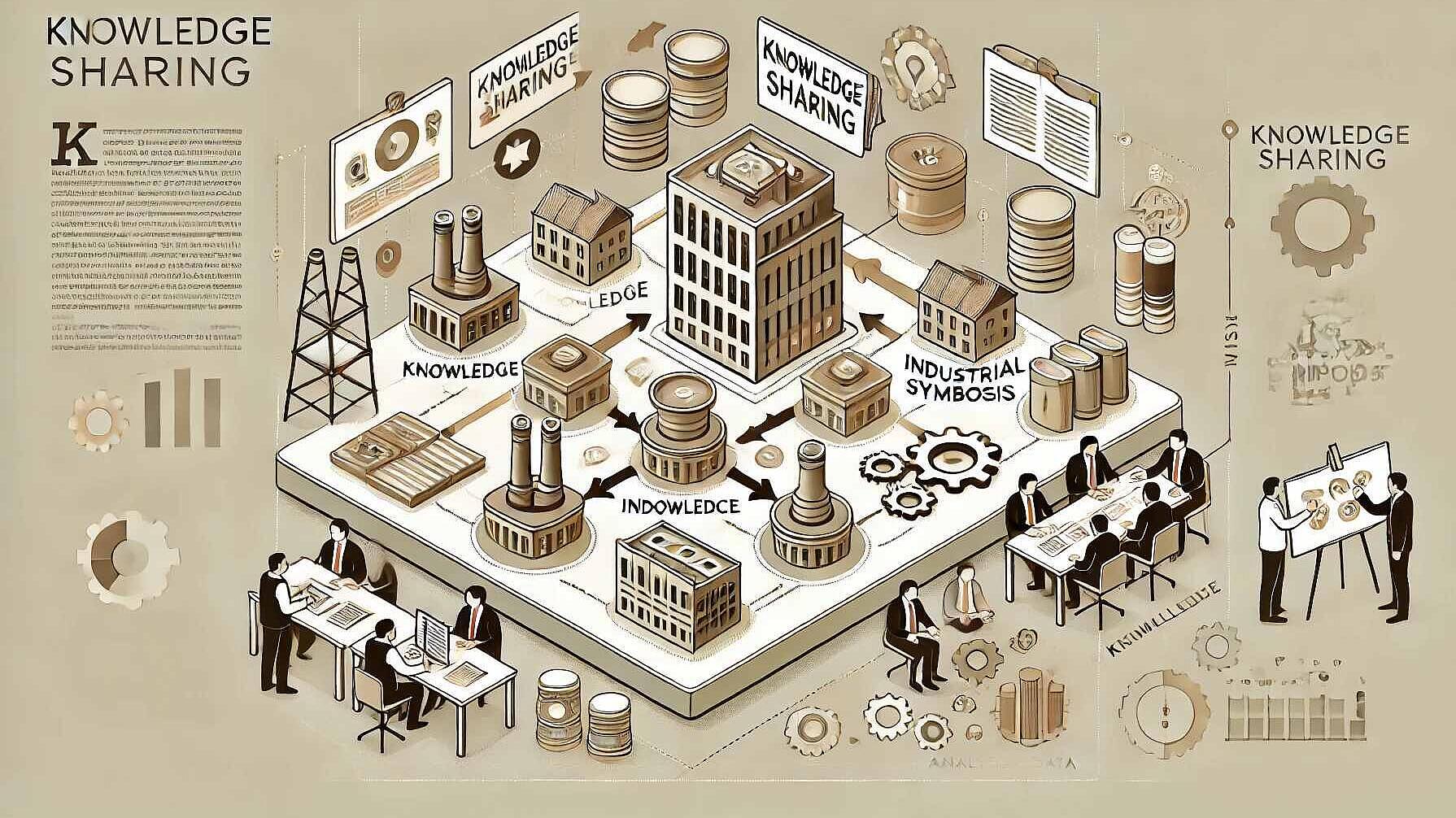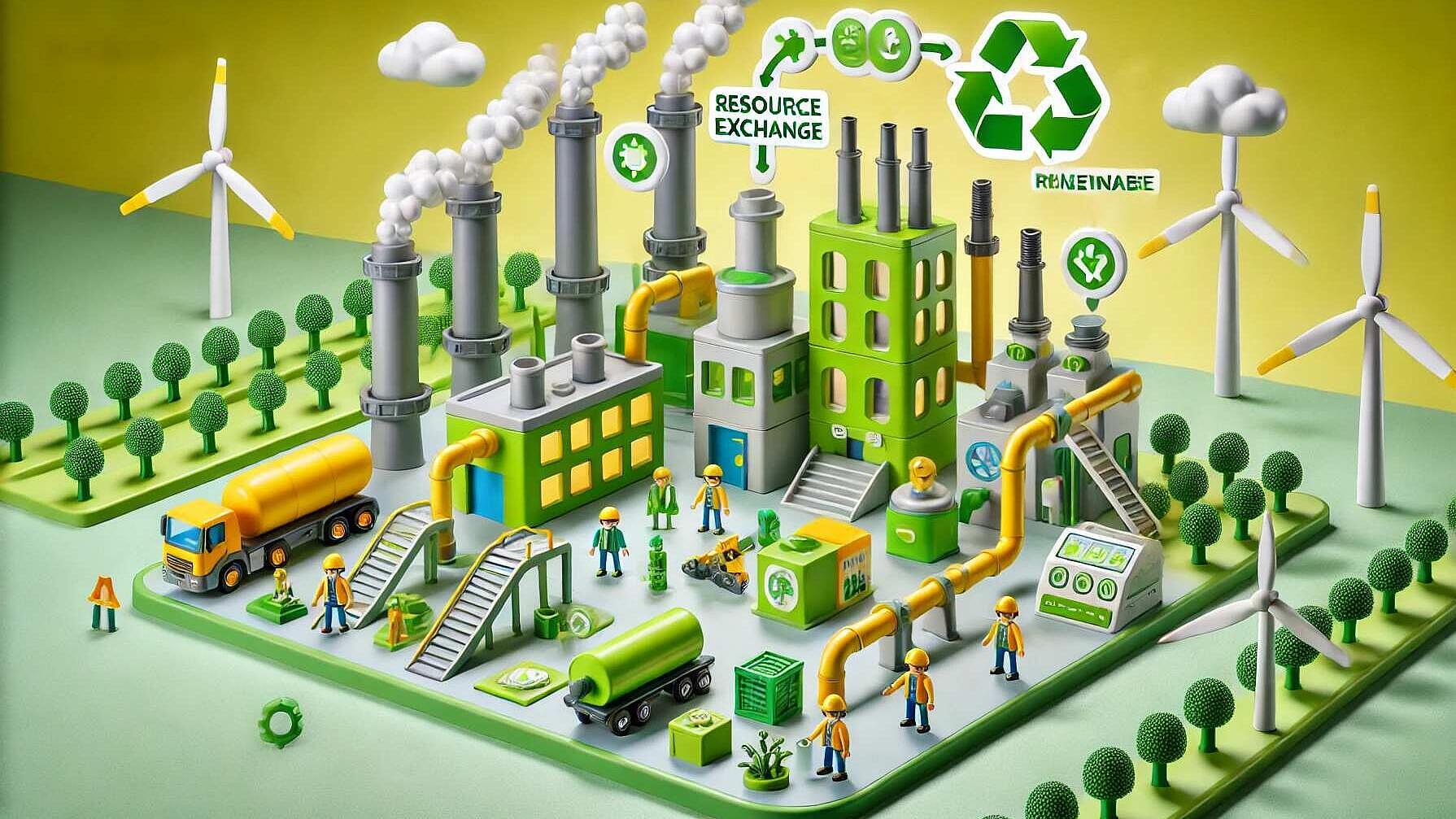 Energy Efficiency
is connected
Energy Efficiency
is connected
Facilitating Knowledge Sharing in Industrial Symbiosis Networks: The Key to Sustainable Innovation
Summary
Industrial symbiosis (IS) is transforming how industries operate, fostering interconnected networks that support sustainability and efficiency. The evolution of IS shows a shift from traditional industrial parks to complex, decentralized networks leveraging digital platforms and advanced analytics to optimize resource utilization. These advancements are recognized for their potential to contribute to the circular economy and reduce emissions.
The transition to effective IS networks involves overcoming knowledge barriers, a challenge primarily addressed by the roles of facilitators. These facilitators act as knowledge brokers, connecting firms with aligned interests and capabilities, and work as trust builders to ensure open and secure communication among participants. They also function as capacity developers by enabling firms to engage effectively in IS through training and technical guidance, serve as innovation catalysts by fostering new technologies, and act as policy navigators to aid in regulatory compliance.
Real-world examples like Kalundborg in Denmark and the UK's NISP illustrate facilitators’ impact in actualizing economic and environmental benefits through resource exchange and waste reduction. Looking ahead, as digital transformation and climate change considerations become more pressing, facilitators' roles are expanding, presenting new opportunities for those interested in sustainability careers. Engaging with knowledge-sharing organizations and staying informed on technological advancements in IS are ways for young professionals to contribute to sustainable industrial practices.
Open full article
Facilitating Knowledge Sharing in Industrial Symbiosis Networks: The Key to Sustainable Innovation
The following article is a summary of the report “Facilitator roles for knowledge sharing in industrial symbiosis" delivered by the EU project CORALIS. And it is also a training article for the Enerwhizz, which is a fast-paced quiz on energy transition, greentec and renewables. Answer 5 YES-No questions in 45 seconds to earn cash coins and win prices delivered to your office or home. No registration, just play!
Check: https://enerwhizz.app/
Industrial symbiosis (IS) is revolutionizing how industries interact, shifting from isolated entities to interconnected networks that exchange resources, byproducts, and knowledge. This transformation fosters sustainability, enhances efficiency, and strengthens competitiveness. However, the emergence of IS networks is complex, requiring coordinated efforts to share knowledge effectively. Facilitators play a critical role in this transition, bridging gaps between firms and enabling the successful development of these collaborative ecosystems.
The Evolution of Industrial Symbiosis
The concept of industrial symbiosis has evolved from traditional industrial parks to dynamic, decentralized networks. In the past, co-located industries would share resources through direct exchanges, such as heat, water, or raw materials. However, modern IS networks extend beyond geographical proximity, relying on digital platforms and knowledge-sharing mechanisms to optimize resource use.
Recent advancements in data analytics and artificial intelligence have accelerated the identification of synergies among firms, making IS networks more efficient and adaptive. Governments and industry leaders are increasingly recognizing the potential of IS to drive the circular economy, reduce emissions, and improve resource efficiency. Despite this progress, knowledge barriers remain a key challenge in the formation and growth of IS networks. This is where facilitators become indispensable.
Understanding Facilitator Roles in Knowledge Sharing
Facilitators act as intermediaries who ensure the smooth exchange of knowledge between stakeholders in an IS network. Their roles vary depending on the stage of network development, the needs of the participants, and the complexity of interactions. The primary roles of facilitators can be categorized as follows:
1. Knowledge Brokers: Facilitators function as knowledge brokers by connecting firms with complementary capabilities. They collect, organize, and distribute relevant information that helps companies identify opportunities for symbiotic relationships. This role is particularly crucial in the early stages of IS network formation, where firms may lack awareness of potential collaborations.
2. Trust Builders: Industrial collaboration requires trust, particularly when firms share sensitive operational data. Facilitators establish credibility, foster open communication, and mediate conflicts. By maintaining neutrality and ensuring transparency, they help participants feel secure in knowledge-sharing processes.
3. Capacity Developers: Not all firms possess the expertise to engage in industrial symbiosis effectively. Facilitators provide training, workshops, and technical guidance to build the capabilities of network members. This includes helping firms understand regulatory frameworks, best practices in resource exchange, and the economic benefits of IS participation.
4. Innovation Catalysts: Facilitators encourage innovation by bringing together diverse stakeholders, including businesses, researchers, and policymakers. They create spaces for collaborative problem-solving and support the development of new technologies that enhance industrial symbiosis.
5. Policy Navigators: Regulatory compliance is a significant concern for firms engaging in IS. Facilitators help interpret complex policies, advocate for favorable regulations, and connect firms with government agencies that provide incentives for sustainable industrial practices.
Case Studies: Real-World Impact of Facilitators
Successful IS networks across the globe highlight the importance of facilitators in knowledge sharing. For example, in Kalundborg, Denmark, one of the world’s most renowned industrial symbiosis networks, facilitators played a crucial role in fostering collaboration among diverse industries. By systematically mapping resource flows and mediating agreements, they enabled the exchange of steam, water, and byproducts between power plants, pharmaceutical companies, and other industrial players.
Similarly, in the UK’s National Industrial Symbiosis Programme (NISP), facilitators acted as connectors, helping businesses identify cost-saving opportunities and alternative uses for waste materials. Their efforts resulted in significant economic and environmental benefits, including reduced landfill waste and lower carbon emissions.
Future Prospects and Opportunities
As industries increasingly embrace digital transformation, the role of facilitators is evolving. Digital platforms powered by artificial intelligence are enhancing the efficiency of knowledge-sharing processes. Smart databases and machine-learning algorithms now help identify and recommend optimal resource exchanges between firms. In this landscape, facilitators are shifting from manual matchmaking to strategic advisors who guide firms through technological adoption and regulatory changes.
Furthermore, as climate change concerns and resource scarcity intensify, the demand for well-coordinated IS networks will continue to grow. Governments and industries must invest in facilitator training programs, equipping professionals with interdisciplinary skills that encompass technical expertise, policy knowledge, and stakeholder engagement.
Taking Action: How Young Professionals Can Engage
For students and young professionals interested in sustainability and industrial symbiosis, there are numerous ways to get involved. Pursuing careers in environmental management, industrial ecology, or circular economy consulting can provide opportunities to contribute to IS networks. Engaging with organizations that promote knowledge sharing, such as the Ellen MacArthur Foundation or regional industrial symbiosis programs, can also provide valuable insights and networking opportunities.
Additionally, staying informed about advancements in data analytics and digital platforms can offer a competitive edge. As the industry increasingly leverages technology for industrial symbiosis, professionals with expertise in both sustainability and digital transformation will be in high demand.
Conclusion
Facilitators are the linchpins of knowledge sharing in industrial symbiosis networks, ensuring that firms collaborate effectively to maximize resource efficiency and sustainability. Their roles as knowledge brokers, trust builders, capacity developers, innovation catalysts, and policy navigators are essential in overcoming barriers to industrial collaboration. As digitalization reshapes the landscape, the responsibilities of facilitators are expanding, offering exciting career prospects for young professionals. By understanding and supporting the work of facilitators, industries can accelerate the transition toward a more sustainable and interconnected future.
If you read the full article, you are perfectly equipped to play and win. And to have fun with friends leagues, leaderboards, missions and whizzers. And likely in your language as we are supporting 12 languages.
And if you found nuggets you want to have a deeper look at – check the source document, the report “Facilitator roles for knowledge sharing in industrial symbiosis" delivered by the EU project CORALIS.



